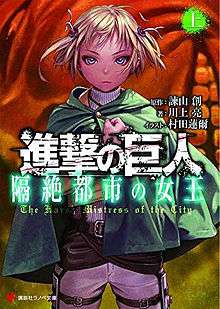Attack on Titan: Harsh Mistress of the City
| Attack on Titan: Harsh Mistress of the City | |
 The cover of the first volume of Attack on Titan: Harsh Mistress of the City. | |
| 進撃の巨人 隔絶都市の女王 (Shingeki no Kyojin: Kakuzetsu Toshi no Joō) | |
|---|---|
| Light novel | |
| Written by | Ryō Kawakami |
| Illustrated by | Range Murata |
| Published by | Kodansha |
| English publisher |
‹See Tfd› |
| Original run | August 1, 2014 – May 1, 2015 |
| Volumes | 2 |
Attack on Titan: Harsh Mistress of the City (進撃の巨人 隔絶都市の女王 Shingeki no Kyojin: Kakuzetsu Toshi no Joō) is a Japanese light novel series by Ryō Kawakami, based on the manga Attack on Titan (進撃の巨人 Shingeki no Kyojin) by Hajime Isayama. The series is published by Kodansha in Japan and by Vertical in North America.
Plot
The story follows Rita Iglehaut (リタ Rita), a 15-year-old member of the Garrison Regiment, and her childhood friend, Mathias Kramer (マティアス Matiasu), the son of wealthy merchants, as their home, Quinta District (クィンタ区 Kuinta Ku), comes under siege after the breaching of Wall Maria.
Release
The novel was announced in the 33rd issue of Kodansha's Weekly Shōnen Magazine on July 16, 2014.[1] The books are written by Ryō Kawakami and illustrated by Range Murata.[1][2] Kodansha published the first volume on August 1, 2014.[1]
North American publisher Vertical announced their license to the series at their New York Comic Con panel on October 11, 2014.[3][4]
| No. | Title | Japanese release | English release |
|---|---|---|---|
| 1 | Attack on Titan: The Harsh Mistress of the City, Part 1 Shingeki no Kyojin: Kakuzetsu Toshi no Joō (Ue) (進撃の巨人 隔絶都市の女王(上)) | August 1, 2014[5] ISBN 978-4-06-375296-0 | August 25, 2015[6] ISBN 978-1-941220-62-7 |
| 2 | Attack on Titan: The Harsh Mistress of the City, Part 2 Shingeki no Kyojin: Kakuzetsu Toshi no Joō (Shita) (進撃の巨人 隔絶都市の女王(下)) | May 1, 2015[7] ISBN 978-4-06-375299-1 | September 29, 2015[8] ISBN 978-1-942993-29-2 |
Reception
Rebecca Silverman of Anime News Network gave the first volume a grade of B+, calling it "easily the most readable AOT novel to come out in English". She noted that "the novel feels like it skews younger than previous entries into the series." She felt that Mathias and Rita were believable characters, but expressed a wish to see more of Rita, feeling that her story was more compelling. She concluded by writing that the series was an easy, enjoyable read, and was more likely to appeal to a broader audience than previous novels in the franchise.[9]
References
- 1 2 3 "Attack on Titan Novel Illustrated by Last Exile's Range Murata". Anime News Network. July 11, 2014. Retrieved April 18, 2016.
- ↑ Green, Scott (July 30, 2014). "Range Murata Covers "Attack on Titan" Novel". Crunchyroll. Retrieved April 18, 2016.
- ↑ "Vertical Licenses More Attack on Titan Light Novels". Anime News Network. October 11, 2014. Retrieved April 18, 2016.
- ↑ Green, Scott (October 12, 2014). "Vertical Announces "Attack on Titan: Harsh Mistress of the City" Light Novel". Crunchyroll. Retrieved April 18, 2016.
- ↑ 進撃の巨人 隔絶都市の女王(上) [Attack on Titan: Harsh Mistress of the City (1)]. Kodansha (in Japanese). Retrieved April 18, 2016.
- ↑ "Attack on Titan: The Harsh Mistress of the City, Part 1". Penguin Random House. Retrieved April 18, 2016.
- ↑ 進撃の巨人 隔絶都市の女王(下) [Attack on Titan: Harsh Mistress of the City (2)]. Kodansha (in Japanese). Retrieved April 18, 2016.
- ↑ "Attack on Titan: The Harsh Mistress of the City, Part 2". Penguin Random House. Retrieved April 18, 2016.
- ↑ Silverman, Rebecca (October 15, 2015). "Attack on Titan: Harsh Mistress of the City Novel 1 - Part 1". Anime News Network. Retrieved April 18, 2016.
Further reading
- Young, Amanda (January 10, 2016). "Attack on Titan The Harsh Mistress of the City Vol. 1". Neo.
External links
- Attack on Titan: Harsh Mistress of the City at Kodansha (Japanese)
- Attack on Titan: Harsh Mistress of the City (light novel) at Anime News Network's encyclopedia